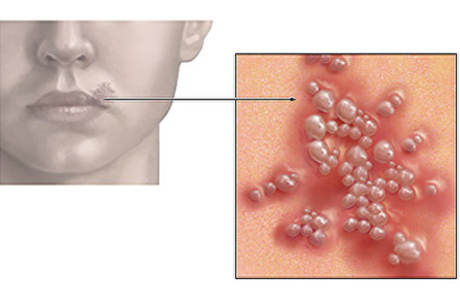HERPES – a contagious and common sexually transmitted infection for which there is NO CURE
What is it?
Herpes is a very common and highly infectious virus which has two types: Herpes Simplex Virus Type 1 (HSV I) – The most likely cause of cold sores, typically around the mouth. This virus can also be caught genitally through oral sex.
Herpes Simplex Virus Type 2 (HSV II) – The virus that typically causes sores, typically around the genitals. It may also be caught around the mouth through oral sex.
Your test will tell you which (if any) type of the virus you have.
HSV I or cold sores should really not be considered an STI as infection can occur in so many non-sexual ways, although it is responsible for about half of “genital herpes” cases.
HSV II, or Genital Herpes, is typically caught on the genitals and is transmitted through sexual contact. Up to 60% of people who have HSV II are unlikely to know they are infected as their symptoms will be minimal or non-existent. They are capable of infecting partners through sex when the virus is present on the genitals, causing pimples, little cuts, itchy or sore skin. Occasionally, there may be a virus present with no visible sign (asymptomatic viral shedding).
Why bother getting tested?
This infection can recur throughout a person’s lifetime and leaves a painful, blistering rash. It is best to know whether you have been exposed to herpes and to make plans in the eventuality of an outbreak and to inform sexual partners.
It is spread through unprotected oral, vaginal or anal contact (it does not have to be sex) with an infected person. The risk of catching or transmitting the virus is highest when your partner has blisters or sores. It is still possible to get HSV 2 when your partner does not have any visible sores or blisters but this is much less likely. Recurrent symptoms are almost always on visible skin – sores inside the vagina or anus are usually only present as part of primary infection and are unlikely to accompany a recurrence.
HSV I is often spread by kissing which is why a lot of people have it.
How will I know if I have it?
HSV may cause blisters on the genital areas of both men and women. These blisters typically develop within 2 days to 3 weeks after first getting infected. The blisters start off as small bumps, grow into full blisters, and burst releasing pus. Blisters can be small or large and can be just one blister, or many located close together. Other symptoms can include painful itching, burning, headache, swollen glands in the groin, and generalized muscle aches. The first episode or outbreak is usually the most severe with later outbreaks becoming milder. Most people catch the virus without developing these symptoms.
Herpes tests cost £150 per sample

Herpes is a common (STI) that can affect the mouth and the genital areas, and that can recur throughout a person’s life.
The average rate of recurrence is 4-5 times in the first 2 years
Testing and screening for Genital Herpes
There are three ways of testing for the virus:
- Blood Test – standard test
- Urine Test – only if you currently have symptoms
- Swab Test – if you have a blister or other lesion for swabbing to see if it is caused by HSV
Results are available 2- 3 working days from the sample being received in the lab depending on which sample is taken. The test will say whether you have HSV I, HSV II, both or neither.
Treatment of Genital Herpes
Like several other infections, once it is caught, HSV I and HSV II stay in the body forever and a minority of those infected get recurrent outbreaks. Fortunately, there are ways to decrease the frequency and severity of the outbreaks. There are anti-viral medications available (both creams and pills) which can help control the infection. Lifestyle changes are very important and can also help to control the time between outbreaks and their severity. Our clinics can provide you with a prescription for medication and give advice on lifestyle changes to help you control the infection if you test positive.
Most carriers of HSV need no treatment because symptoms are slight or non-existent.
Oral anti-viral medication for recurrent flare-ups
Our doctors will be happy to help manage acute herpes breakouts with a course of oral anti-viral medication. The usual dose is 400mg taken five times per day for 1 week. Please don’t suffer in silence – call us today.
